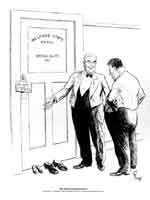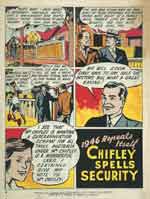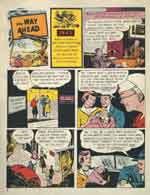|
|
||
|
LOOK
EVER FORWARD Not long after John Curtin died, Muriel Heagney, a colleague in the Victorian Labor Party, described how John Curtin had explained to her that "whilst he had not sought the honour, he welcomed the post" of Leader of the Labor Party in 1935 "because of the opportunity it offered to bring nearer the dreams of his youth, to lay the foundation of a social order to which men and women - not brick, mortar and wealth -would have the highest value". She went on to say "It was no secret that every time he asked for a fresh sacrifice in the present war, from our armed forces and the workers, in the interest of national safety, he registered afresh his vow that they, and their kith and kin, would be adequately compensated by a new deal in the postwar world". While John Curtin is best remembered as a war-time Prime Minister, his work in setting up a framework which would carry Australia towards the kind of society he had always fought for in peace time is less well known. As early as 1942, John Curtin set up a Department of Postwar Reconstruction which developed policies to establish a Commonwealth Housing Commission, the postwar Rural Reconstruction Commission, the Secondary Industries Commission and the Commonwealth Reconstruction Training Scheme. He also found the time and the political support to make changes in the taxation system so that the Federal Government had more financial resources available to it. He set up the foundations for a greater social welfare role for the Federal Government, such as the Widow's Pension Act, and the Unemployment and Sickness Benefits Act. |
In 1944 he set up the Department of Immigration which was to be responsible for organising postwar immigration to Australia. These changes were the basis for the enormous growth of the Australian economy in the postwar years. WHAT IS THE
ROLE OF FEDERAL GOVERNMENT? There have been many changes in Australia since John Curtin's death in 1945. Postwar migration schemes, industrialisation and more recently the collapse of traditional industries, mass education, processes of globalisation, the end of the Cold War - all contributed to create a vastly different society. Many would argue that these changes have quelled the need for a social welfare program in the way that Curtin and Chiefly argued for it. In fact, the socialist cause has suffered a series of dramatic setbacks and no longer has the popular support it once had. However, some questions remain. What should be the role of a national government in providing for the basic needs of people? What are those basic needs? Can the private sector ensure that those needs are met? These are the kinds of questions that Australians are currently debating. "Australia is
heading towards [being] a very different nation from the one John
Curtin would have contemplated and ...wished ... The principal task
of a government is to look after its citizens." |
Ted Scorfield The honeymoon is over pen and ink Collection, Art Gallery of Western Australia Presented by the Proprietors of the Bulletin, Sydney "1946
Repeats Itself - Chifley Spells Security." |



